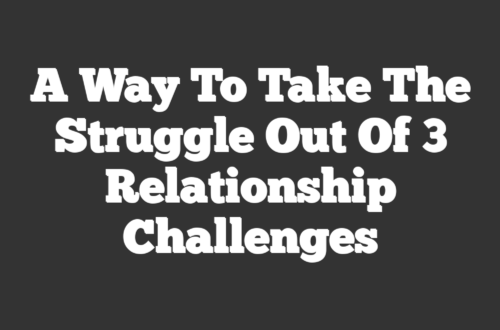
You’re curled up under a blanket, binge-watching your favorite show, when your phone buzzes. It’s a group chat explosion planning an impromptu outing — tonight! Instantly, your heart sank; you were looking forward to a quiet night.
Well, it’s time to talk about the ‘B’ word — boundaries. Yes, that little line that helps you say, “Guys, I’m sitting this one out.”
Now, I know it can feel tricky. The last thing you want is to let your friends down or come off as distant. But guess what? Setting boundaries won’t make you the villain of your friend group. In fact, it’s quite the opposite. Stick around, and I’ll show you how it’s done!
Know What You Need From The Start
When we dive into friendships, we often forget that we’re allowed to have our own needs and preferences.
Knowing what you’re comfortable with and what makes you tick can help you create a friendship that’s comfortable for you. It’s about giving yourself the respect to acknowledge that your feelings and needs matter, just as much as anyone else’s.
Example: Say you’re someone who treasures quiet evenings after a hectic work schedule. You need to be clear with your friend from day one that after-work hangouts are off the table during the weekdays.
Clearly State What’s Okay And What’s Not
No one’s a mind reader; well, at least I haven’t met one yet! That’s why it’s so crucial to communicate your boundaries clearly to your friends. Sometimes, it’s about saying what works and what doesn’t in everyday moments.
Being upfront helps prevent misunderstandings and ensures that your friends know where the line is, helping to dodge any accidental toe-stepping.
Tip: Next time your friend makes a plan that you’re not up for, find the courage to say, “I love spending time with you, but I can’t join in on this one because I’ve got other commitments.”
Plan Your Boundaries In Advance
Planning your boundaries in advance is somewhat like preparing for a trip. You wouldn’t pack your bags without knowing your destination, right?
Similarly, thinking ahead about your boundaries means you’re not making decisions on the fly or under pressure.
This preventative measure proves that when situations arise, you’re not scrambling to figure out what makes you comfortable or how to communicate it to your friends.
Example: If you decide beforehand that you need a day to yourself each week, make it known. When your friend suggests a get-together on your self-care day, you’ll already have the plan to say, “Let’s find another day; I’ve got plans with myself then.”
Keep Your Boundaries The Same Always
Consistency is key when it comes to setting boundaries. If you’re constantly changing what’s acceptable to you, it can confuse your pals and make them unsure of how to behave around you.
Steady boundaries are like the rules of a board game; stick to them, and everyone knows how to play. This doesn’t mean you’re inflexible — it simply means you have a set of standards that help your friends understand your needs.
Example: Think of the time you’ve told your buddy that you need two days’ notice for plans. If you stick to this rule, they’ll respect it and plan ahead. But if you sometimes accept last-minute invites, they won’t take your boundary seriously.
Talk About Boundaries When Needed
When your friend does something that crosses a line, it’s time for a chat. It’s not about confrontation; think of it as a friendly update on your personal user manual.
And hey, it’s a two-way street; be ready to listen, too, because talking is how we keep our friendships strong and understanding.
Think about it:
- If your friend borrows your things without asking, tell them you’re not okay with that.
- When they call late at night, and it wakes you up, it’s alright to ask them to text first.
- If an inside joke has become hurtful, it’s important to say you’re not laughing anymore.
Change Boundaries If Necessary
Here’s the thing — even well-drawn lines can blur over time. It’s totally fine to modify the rules if a boundary isn’t serving its purpose anymore or if there’s a shift in your life that calls for it.
Keep in mind that changing boundaries is not a sign of weakness; it’s a part of growth. Just make sure to be clear with your friends about any new lines you draw in the sand.
Example: You used to love surprise visits, but now that you’re working from home, they’re not so great. If you tell your friends about this change, they’ll understand that what was once a welcome surprise now needs a heads-up phone call.
Remember Your Friend’s Boundaries, Too
Friendship is a two-player game, and it’s important to respect the rules on both sides. Just as you cherish your own boundaries, your chums have lines that shouldn’t be crossed.
Honoring their limits shows that you value the friendship and understand that respect goes both ways. It’s all about give and take. Remember, they’re more likely to respect your boundaries when they feel theirs are appreciated.
Tip: Maybe your friend doesn’t like to text during work hours. Stick to that, and send your funny memes after they’re off the clock — it keeps things cool and respectful.
Agree To Changes When They Make Sense
Flexibility is a golden trait in friendships. As life throws its curveballs, sometimes you and your friends have to bend a bit.
Agreements can change, and when they do make sense, go with the flow. This shows that your friendship can adapt and grow over time, which is a pretty special thing.
Example: Your friend starts a night class and can’t make your usual movie nights. It’s cool to switch days so you can keep the tradition alive and support their new schedule.
Talk Nicely But Be Strong
Having a heart-to-heart doesn’t mean you have to be a pushover. You can drop the sugar-coating and still be sweet, right?
Speak with kindness and keep your voice steady — it lets your friends hear the serious tone behind your friendly words. It’s amazing how much more people grasp your point when you deliver it with firm kindness.
Example: When your mate forgets your last chat and goes against your wishes, a gentle but firm reminder is in order. A simple, “Hey, remember how I mentioned I need a heads-up before visits? Let’s stick to that, okay?” does the trick.
Speak Up But Stay Calm
Your voice matters, especially when it comes to laying down your boundaries. It’s all about hitting the right tone: firm enough to be heard, yet cool enough to keep things breezy.
When you manage to keep your chill while discussing what’s important to you, the message sticks better, and the conversation stays friendly. A calm approach can steer the talk away from tension and make the chat more like a catch-up than a confrontation.
Tip: If something bugs you, address it as soon as you feel calm enough to talk it through without getting heated. “I felt a bit sidelined when you interrupted me earlier. Can we talk about it?”
Watch How You Act, Not Just What You Say
Actions speak louder than words, right? Well, when it comes to setting boundaries, how you act is the megaphone. You might say you need more “me time,” but if you’re always saying yes to every hangout, mixed messages are being sent.
It’s like telling someone you’re on a diet while you’re holding a giant slice of cake. Aligning what you do with what you say shows your friends that you mean business.
Example: When you’ve set a no-phone rule at dinner and your phone buzzes, be the first to ignore it. Your friends will notice and likely follow suit.
Don’t Let Fear Stop You From Making Boundaries
It can be scary, standing up and drawing a big ol’ line in the sand. However, friendships that don’t respect your boundaries might not be the ones you want to keep.
It’s better to face a bit of discomfort now than to endure a friendship that feels stifling. After all, setting boundaries is about making your relationships healthier and happier for everyone involved.
Think about it:
- Fear of upsetting your friend can keep you from saying “no” when you really need to.
- Embracing the discomfort of setting boundaries can lead to stronger, more respectful relationships.
- Just like trying anything new, the more you practice setting boundaries, the easier it becomes.
Speak Clearly And Straightforwardly
When it’s boundary-setting time, it’s best to cut to the chase. Use simple words that leave little room for confusion because when you’re clear and to the point, your friends know exactly where you stand.
It’s like giving directions; if you’re clear, nobody gets lost. This straightforward approach helps avoid any future mix-ups or misunderstandings.
Tip: “I’m stressed when we’re late, so could we aim to be on time for our plans?” This announces your need for punctuality in a way that’s hard to misinterpret.
Stay Firm But Polite
Holding your ground doesn’t mean you have to put up walls. You can fend off pressure with a smile, insisting on your boundaries while keeping the peace.
Staying gentle yet steady lets your friends know you’re serious, but you’re not upset. Politeness opens doors, and in this case, it’s the door to mutual understanding and respect.
Example: If a friend keeps pressing you to share details you’re uncomfortable with, it’s okay to say, “I appreciate your concern, but I’d rather not get into that topic right now.”
It’s Okay To Say “No”
Saying “no” can sometimes feel awkward. Turning down requests or invitations that don’t fit with your values or schedule is not only okay, it’s a must for a healthy lifestyle.
Your “no” is a complete sentence, and it’s a powerful one at that. It’s a boundary in its simplest, strongest form.
Example: The next time you’re asked to chip in on a gift for a colleague you barely know, it’s fine to kindly decline, “Thanks for thinking of me, but I’ll pass on contributing this time.”
Friends Might Need Time To Get Used To Changes
When you decide to set healthy boundaries with your friends, it’s like throwing a curveball in your usual hangouts. Suddenly, you’re not always the ‘yes’ person, and that can feel a bit odd for everyone.
It’s okay, though, because adapting to changes is part of life — even in friendships.
Your pals might need a minute (or a few!) to understand where you’re coming from. It’s all about giving them the space and time to adjust to the new dynamics without pushing too hard.
Think about it:
- When you start saying “no” to late-night outings because you value your sleep more, your friends might initially be surprised.
- If you express that you need a heads-up before they drop by your place, they might forget once or twice. It’s new for them, too.
Don’t Hurt Yourself To Keep Friends Happy
Believe it or not, it’s not your job to fix everything or be everything for your friends. Setting boundaries is a way to take care of yourself first, so you can be a better friend in the long run.
It’s a tough pill to swallow, but your true friends will understand and support you. The bottom line? You have to be kind to yourself before you can pour into others.
Tip: When a friend asks for one too many favors and you’re feeling overwhelmed, it’s alright to step back. “I can’t help out this time. I need to recharge my own batteries.”
Think About How Tech Impacts Your Boundaries
We all love our gadgets, right? But here’s the kicker: Sometimes, tech can sneakily mess with our personal space without us even noticing. It’s like, one minute you’re chilling, and the next, your phone is buzzing non-stop with messages from friends.
This constant connection can make it tough to enjoy some quiet time and can blur the lines between being available and being overwhelmed. Understanding how tech affects your boundaries is key to keeping that digital sanity in check.
Think about it:
- Your phone becomes a 24/7 hotline for friends who text at all hours. Where’s the off switch?
- Social media means everyone knows what you’re up to. Ever miss the days of a little mystery?
Talk About Boundaries Often
Boundaries shouldn’t be a one-off conversation. They’re an ongoing dialogue that evolves as your friendship does.
Regularly talking about them keeps everyone on the same page and can prevent a lot of conflicts. It’s all about open communication — getting comfy with being honest about what works for you and what doesn’t.
Example: During a catch-up, you might say, “I just wanted to say I really appreciate you understanding my need for solo time on weekdays. It means a lot.”
It’s Okay If It’s Hard To Set Boundaries
Setting boundaries might feel like trying to solve a Rubik’s cube — tricky and a bit intimidating. That’s normal, especially if it’s new to you. Remember, it’s a skill that gets easier with practice.
And hey, it’s completely fine if you don’t get it perfect from the get-go. Recognize that it’s a process, and give yourself some slack. It’s about finding balance, not about being perfect overnight.
Think about it: Saying “no” can feel like you’re the villain in your own story. Spoiler: You’re not!
Ask For Help If It’s Too Hard
If you’re finding it super tough to set or maintain boundaries, it’s alright to tag someone in.
Whether it’s a friend who’s a pro at this, a family member, or even seeking out a professional’s guidance, getting help can make a world of difference. You don’t have to go solo on this journey. Sometimes, a little support is all it takes to find your footing.
Example: If you’re unsure how to tell a friend about a new boundary, practice with someone you trust. “I’m going to tell Alex that I can’t take his calls during work. How does this sound?”
Frequently Asked Questions
Is it selfish to set boundaries?
Not at all! Think of boundaries as self-care. You’re looking out for your own well-being, and that’s good for you and everyone around you. Healthy boundaries actually make for stronger, happier friendships.
Are there specific types of boundaries I should set with friends?
It’s beneficial to set various types of boundaries, including emotional (sharing feelings), time (availability for hanging out), physical (personal space and touch), and material (lending belongings). Tailor these boundaries according to your comfort levels and needs.
How do I deal with friends who react negatively to my boundaries?
It’s tough when friends don’t take your boundaries well but stand firm. Remember why you set them in the first place. Offer to discuss their concerns, but also be willing to hold your ground if they’re asking you to compromise your well-being.
What are some signs I might be overstepping someone else’s boundaries?
Signs you might be overstepping include your friend withdrawing, showing discomfort, or directly expressing that your actions or requests are too much. Being attentive and respectful of their signals is crucial in maintaining a healthy friendship.
Final Thoughts
Boundaries — did that word make you pause at first? I bet now you see it’s more like a friendship superpower. It’s not about keeping friends away; it’s about keeping the friendship comfy for you both.
Yeah, setting boundaries takes guts, but the payoff? Huge. It’s all about making sure everyone’s on board, and no one’s getting the short end of the stick.
Think it’s time to take the leap? I say, go for it! Sit down with your friends, have that heart-to-heart, and lay down what’s cool and what’s not. Keep it real and simple. It’s all about making sure everyone’s happy, including you. Your friendships are set to get a whole lot stronger for it.




